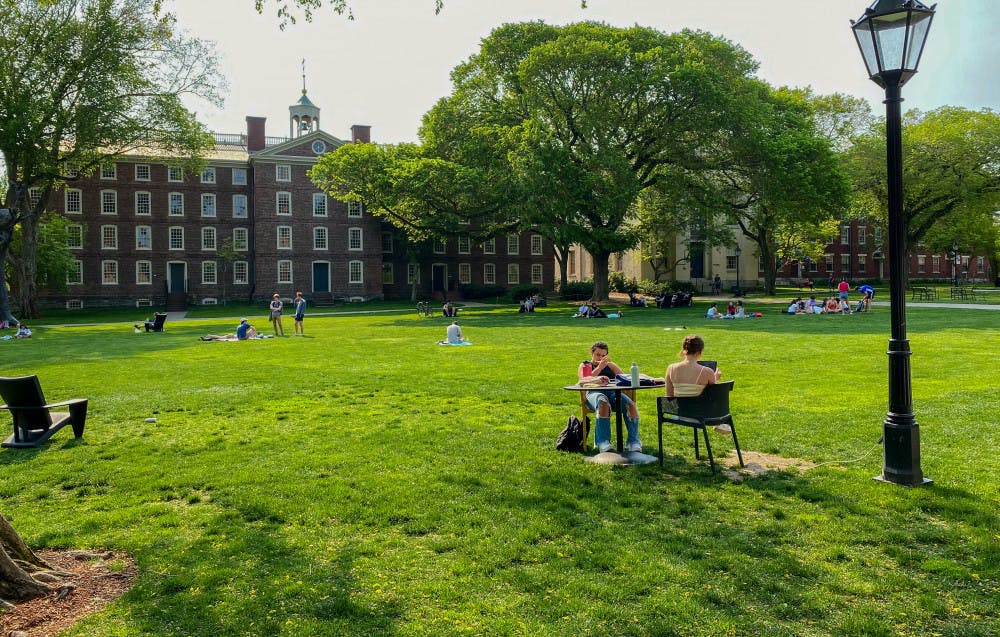The University’s first full summer term in recent history kicked off with the start of virtual classes May 12.
Since the start of the COVID-19 pandemic, professors have had to adapt their courses and teaching techniques to online learning via Zoom. For many, this has meant being more flexible with assignments and adjusting coursework and assessments for a virtual environment.
“My approach has evolved in that everything is slowed down,” said Connie Crawford, adjunct lecturer in theater arts and performance studies. “I’ve had to shift class expectations because the situation in the world changes so drastically so often. … I need to judge how the students are functioning.”
While maintaining student engagement with online teaching remains challenging, many professors have done their best “to meet pre-COVID course learning goals while recognizing that not all methods that work in person work well online,” wrote James Russell, professor and department chair of Earth, Environmental and Planetary Sciences, in an email to The Herald.
When it came to deciding to teach during the summer term, professors wanted to provide first-year students with an immersive and holistic learning experience and make up for their lack of a fall semester.
“I volunteered to make sure we had a set of good courses for summer students in my department,” Russell wrote.
For some, like Associate Professor of Classics Johanna Hanink, the decision to teach in the summer came from a more logistical standpoint of distributing her workload evenly throughout the whole year. Hanink has previously worked during the University’s typically shorter summer terms, and was able to “elaborate and expand” upon those courses for this year’s formal summer semester.
“This semester will definitely be different because my class will be expanded from the normal summer semester, which is seven weeks, to thirteen,” Hanink said. “Students will have more time and the class won’t be as intensive.”
Crawford is particularly excited that many classes will be made up nearly entirely of first-years, which she said would allow for more in-person collaboration. While having a mix of students from different years is valuable, first-years are being afforded a truly unique opportunity, Crawford said.
The summer term is allowing professors to workshop their courses and to better tailor them to the first-year experience by introducing new teaching methods and decompressing their regular course load.
While getting to know students remotely during the term’s first week of classes has been challenging, students are bringing “interest and insights to the courses,” Hanink said.
Student engagement has already increased greatly, with Crawford having an unusually large number of prospective students on her course’s waitlist. “It’s frustrating because I want to accommodate them all,” Crawford said. “But it’s also great to see such interest on behalf of first-years.”
Professors had the chance to meet these students after in-person and hybrid classes began Wednesday.
“I'm looking forward to the first-years having more personal interactions with each other,” Crawford said. “My students were always willing to do whatever it took to learn, but there is more joy that comes with being in-person. It’s more fun to actually be in the same space with each other, just adds a whole other element to the work.”
Other professors are similarly excited about the start of hybrid instruction.
“There’s a whole social psychology of the classroom that is vitiated when you do it virtually,” Professor of Sociology Gregory Elliott told The Herald. “By being back in person, I hope that students become more engaged and fascinated with looking at human beings through new lenses.”
Despite its promise, the summer term also brings some drawbacks. While professors like Hanink who have previously taught in the summer have found it easy to adjust their courses for the extended term, others have run into issues.
Russel wrote that he has had to scale back research opportunities and other student commitments in favor of his new teaching schedule. Elliot said he struggled to find undergraduate teaching assistants due to the lack of upperclassmen on campus.
Still, for professors, the summer term brings new hope for the return of in-person normalcy at the University.
“It’s great that Brown could afford to try this three-semester system,” Crawford said. “Remote learning has been a strain on administrative staff and the faculty, … I look forward to teaching in person this summer.”

Alex Nadirashvili was the managing editor of multimedia and social media for The Brown Daily Herald's 133rd Editorial Board. As a former University News editor, he covered faculty, higher education and student life, though his proudest legacy is The Brown Daily Herald TikTok account.





